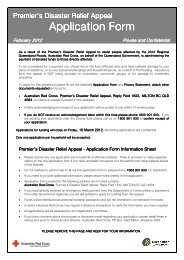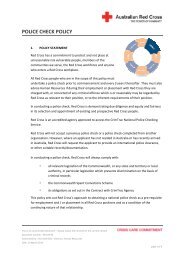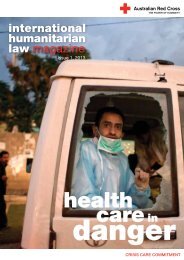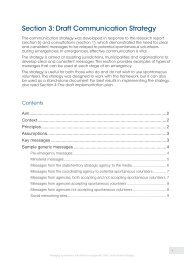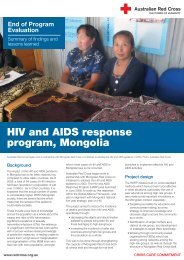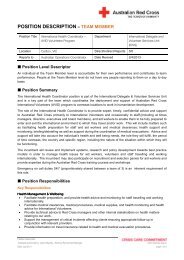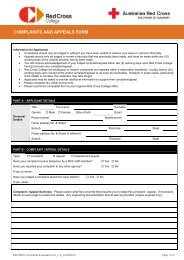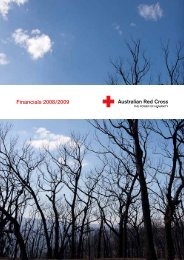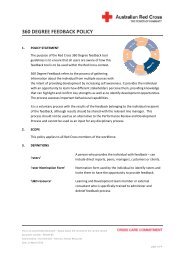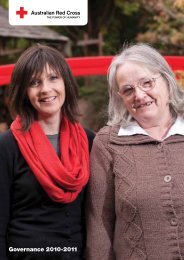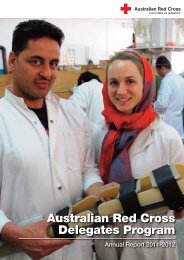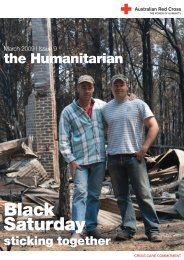Humanitarian - Australian Red Cross
Humanitarian - Australian Red Cross
Humanitarian - Australian Red Cross
You also want an ePaper? Increase the reach of your titles
YUMPU automatically turns print PDFs into web optimized ePapers that Google loves.
Males in Black Vice-Chair Robert Taylor and his family. Photo: Wayne Quilliam Photography<br />
In Port Augusta,<br />
the Males in Black<br />
program, which has<br />
been operating since<br />
1989, is supporting<br />
young Aboriginal<br />
fathers in a oneon-one<br />
mentoring<br />
program supported<br />
by <strong>Red</strong> <strong>Cross</strong>.<br />
Males in Black: supporting Aboriginal fathers<br />
Males in Black grew out of a committee<br />
formed by the local Aboriginal<br />
community following the premature<br />
deaths of two young men. The<br />
committee members wanted to improve<br />
Aboriginal men’s social and emotional<br />
wellbeing, and issues such as the impact<br />
of the stolen generation and exclusion<br />
by the mainstream population of the<br />
town, and realised there was a lack of<br />
programs for local men.<br />
Robert Taylor, Males in Black Vice-<br />
Chair and a born-and-bred local, says<br />
that he was an example of the type of<br />
client that the program helps. ‘I was<br />
about to become a father but there’s<br />
no manuscript on being a father, which<br />
some of us fathers do need. I was<br />
slowly coming down from alcohol and<br />
drugs and hanging around the wrong<br />
people. Basically, I had to make some<br />
adjustments to my life so that I could<br />
be a positive role model for my son<br />
and my daughters,’ Robert says.<br />
Almost 20 per cent of the Port Augusta<br />
population is Aboriginal, compared<br />
with the Australia-wide average of 2.5<br />
per cent. The Aboriginal population is<br />
also much younger, with an average<br />
age of 23 years, compared with 36<br />
years for non-Aboriginal people.<br />
Aboriginal and Torres Strait Islander<br />
peoples in Port Augusta face poverty,<br />
discrimination, remoteness and a lack<br />
of opportunities.<br />
While health programs have focused<br />
on strengthening the bonds between<br />
mothers and their babies, the benefits<br />
of programs supporting fathers<br />
are increasingly being recognised.<br />
There have also been low rates of<br />
participation of Aboriginal fathers<br />
in family programs. <strong>Red</strong> <strong>Cross</strong> has<br />
recognised this need and supports<br />
the work of Males in Black by<br />
providing premises and services, such<br />
as phones, so that the group can<br />
continue to operate.<br />
‘If there wasn’t a program like Males<br />
in Black here in Port Augusta, we<br />
would be skating on thin ice with a<br />
lot of youth into drugs and alcohol,<br />
pregnancy, in and out of the courts<br />
and jails,’ says Robert.<br />
He says the group is getting a lot of<br />
referrals of troubled young fathers<br />
and that at any one time, the program<br />
helps between 10 and 15 young men<br />
to be better fathers and to break the<br />
cycles of unemployment, offending,<br />
incarceration and addiction.<br />
Robert says that Males in Black<br />
has been successful because it has<br />
gained the trust of the fathers and has<br />
provided one-on-one support from<br />
Aboriginal men who are voluntary role<br />
models and local community members.<br />
The program often conducts its activities<br />
outside work hours to make it possible<br />
for their volunteers and young men to<br />
come together.<br />
Despite his wayward beginnings, being<br />
involved in the Young Dads Project<br />
came naturally to Robert whose<br />
traditional name is Ynimmy, meaning<br />
‘old man’. ‘As a young boy, people<br />
told me that that name is not to say<br />
that you’re an old man, it’s more of<br />
a wise thing, where they can tell if<br />
you’re going to be a wise person in the<br />
future. I’ve had that understanding in<br />
my head since I was a child. I wanted<br />
to be a leader. I want to be that guy<br />
that basically helps my family. I’ve had<br />
all these obstacles, drugs, alcohol,<br />
brothers, mates but I’ve now cemented<br />
myself in a good position as a positive<br />
role model,’ he says. This will have a<br />
big impact in Robert’s local community<br />
and he says that while he has three<br />
children of his own, his kinship<br />
obligations mean he has shared<br />
responsibility for up to 30 children.<br />
Robert says the program teaches<br />
young men to organise camps and<br />
social events, and teach skills like first<br />
aid, budgeting, hunting and gathering<br />
for elders as well as being involved in<br />
things like play groups for young dads<br />
particularly with children up to five<br />
years of age.<br />
Males in Black workshops and<br />
community outreach programs for young<br />
Aboriginal dads aim to build leadership<br />
skills, promote community development,<br />
build stronger families, teach culture and<br />
foster better parenting for children.<br />
The support of <strong>Red</strong> <strong>Cross</strong> for the<br />
project highlights key principles of our<br />
Aboriginal and Torres Strait Islander<br />
strategy, adopted in July 2009, to<br />
work in respectful partnerships<br />
with Aboriginal and Torres Strait<br />
Islander communities by supporting<br />
community-led initiatives.<br />
Page 11





